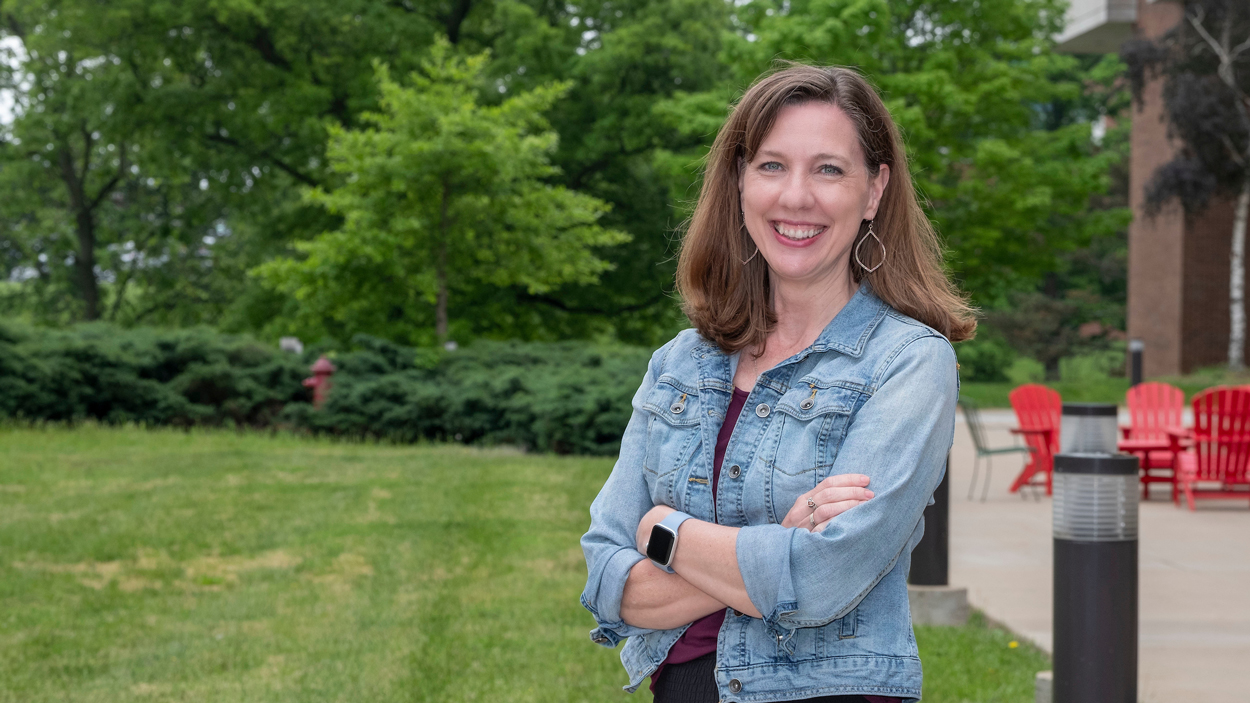
Assistant Professor Renata Sledge presented her research study, “Well-being and self-management of ESKD patients in an online health community,” at the National Kidney Foundation Spring Clinical Meeting in Boston. (Photo by Derik Holtmann)
For many years, Renata Sledge attended the National Kidney Foundation Spring Clinical Meeting while practicing as a dialysis social worker. After a several-year hiatus, she found herself returning to the annual conference in a new capacity.
In April, Sledge, now an assistant professor of social work at the University of Missouri–St. Louis, presented her research study, “Well-being and self-management of ESKD patients in an online health community,” at the five-day event in Boston. The conference is the premier event for interdisciplinary renal health care professionals – dietitians, nurses, physicians and social workers – to explore innovation, research and best practices within the field.
Sledge, along with more than 600 other researchers, had the opportunity to exhibit her work and engage with peers via poster and oral presentations. Her study resonated with the crowd, earning only one of four Outstanding Poster Awards among the sizeable field.
“It always feels good to have your work recognized, and it’s always humbling when you see the good work that other people are doing,” she said. “It just really emphasizes, for me, that people see the value of social connection.”
At UMSL, Sledge’s research has focused primarily on medical decision-making to understand the application of ethics in social work practice. Sledge is particularly interested in better understanding the connection between relationships and autonomy
“I suspect that eventually what we’ll begin to understand is that Renata doesn’t make decisions,” Sledge explained. “Renata as a mother, as a wife, as a social worker, as a friend, as a daughter, makes decisions, and so understanding relatedness is part of that.”
The study grew from Sledge’s previous research and her existing relationship with the Medical Education Institute. The nonprofit provides support and education for people with chronic kidney disease and end-stage kidney disease and promotes self-management of the disease.
Representatives from the organization reached out to Sledge with a proposal. They wanted to better understand the Home Dialysis Central group on Facebook. The group has more than 6,000 active members and is a forum for vibrant discussions and advice about the self-management of kidney disease. Members spent more than a decade cultivating the positive culture of the group, and Sledge said practitioners could tell there was some sort of “magic” happening. However, there had been little investigation into it.
Sledge was interested in pursuing the project because there’s been much speculation in the media about social media driving people apart. Yet, that doesn’t seem to be the case with the Home Dialysis Central group.
“I was curious about that, why are we seeing this real connection here when we’re also hearing that social media is not good and that we’re lonelier than ever?” she said. “So that wasn’t making sense.”
Sledge partnered with Dori Schatell, the executive director of the Medical Education Institute, to conduct the pilot study. The pair administered a cross-sectional survey to members of the Home Dialysis Central group that explored what sources of support members found in the group and how that support affected the members’ well-being and self-management.
The survey showed that members primarily found emotional and informational support in the group. Additionally, people who indicated that they received emotional support reported increased positive affect and decreased loneliness, and people who reported informational support had decreased loneliness and decreased perceived stress. Overall, the findings indicate that active participation in online health communities may potentially improve the well-being of individuals living with chronic kidney disease.
However, Sledge cautioned that health care providers and professionals need to understand how to utilize online health communities effectively.
“I think is important is that health care providers understand what online health communities are and which ones are available, and then they teach people how to use online health communities meaningfully,” she said. “We can’t just tell patients to go out and find a Facebook group, right? We need to teach people media literacy, so that they can use those online communities.”
The results also underscored the importance of assessing patients for loneliness and asking about their social connections. Chronic diseases, including chronic kidney disease, are difficult mentally and physically, and they stay with individuals throughout their lives. Sledge noted that it can be difficult for others to keep showing up, so patients need a “deep and wide bench” of social support. Online health communities can aid individuals in building a broader social network.
Sledge was motivated to bring the study to the National Kidney Foundation Spring Clinical Meeting to give social workers a voice in the renal health care space. In her experience, much of the research presented at the annual conference is focused on treatment and biological aspects of kidney disease. But she views it as a “whole person experience,” so it was important to offer a perspective that accounted for things such as interpersonal relationships and self-determination.
“I just think it’s important to emphasize the importance of thinking collaboratively,” Sledge said. “One of the reasons I like this conference and other conferences where social workers don’t typically show up is that we have to continue to make sure that people see our value in the field. We do play a role in wellness and well-being, so I think it’s important for social workers to show up in spaces where they’re not often thought of as scientists.”














